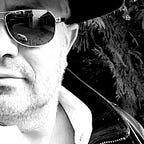My Siblings Don’t Want You to Read This
My father died at age ninety-eight years and twenty-six days, after a decades-long struggle against the cruel wraiths of dementia. As of this writing, there is no winning that war, only enduring until the foregone defeat. He was the last surviving member of his family.
It’s a strange exercise to find words to describe a life that ought to be familiar. Except it isn’t, because all I have to go on are my experiences and a collection of data points. Like a shaman casting bones, we are desperate to read meaning into the handful of traces yet to be swept clean by the tides. These bits of data are not his life, they are the dots and dashes of a cipher, whose key was known only to him.
Even within a family, every child grows up with different parents. The father I knew was not the father my siblings knew, which is not the person his siblings knew, not who my mother knew. And none of those are who he saw himself as.
The flinty truth is that almost nobody lives up to their own expectations for their life. It isn’t epic or heroic. More often, we find ourselves in a Kafka-directed Dostoevsky spinoff, and a minor role at that.
Dad’s parents experienced a magnitude of grief unimaginable today. Half of his thirteen siblings died before (or soon after) reaching adulthood in the dusty sagebrush of Eastern Idaho. Some of them died before he was born, but not all. The impact on home life cannot be diminished.
He was next to the youngest, like myself, so he sat quietly in the corner, overlooking the wreckage of family disputes. Strong-willed parents produce strong-willed children, which often comes as a shock to the parents (he says from experience). Horns locked. Tempers flared. Wounds inflicted. Ultimatums handed down. Not for the first, nor last, time in the history of families.
Dad watched and hated it all. He hated the conflict, the anger, the bitterness. Of all things, he wanted to skip out on the fighting and the ugliness. It lived in that house, fueled by his own father, a brilliant inventor, workaholic, and a thorough-going bastard.
The war came, and it took the life of his beloved older brother, which stabbed deeper into the ruined heart of an already mangled family. My dad and Ervin had grown up dreaming of flying. They converted farm equipment into imaginary airplanes and flew many harrowing adventures in the hot fields of Idaho. Ervin crashed in Queensland, Australia during a storm and it wrecked everyone.
Dad was training as a B-17 pilot at the time, and would later be transferred to the B-29 program as a navigator. The reality of flying held up to his childhood fantasy, and he would hold tight to that love all his days.
He returned home after the war with a pocket full of GI cash and the prospect of inheriting the family business. At a dance, he met the most beautiful girl he had ever known. He was immediately smitten and she had found the perfect mark. So she thought.
Nadine was a farmer’s daughter and, by all accounts, a truly beautiful young lady. If her mental illness had made an appearance by the time they met, she was careful to keep it under wraps. More likely, it had yet to manifest. My mother was, generously speaking, a fabulist who absolutely believed the delicately edited digests of reality she constructed. Such is often the nature of bipolar disorder.
My father was an extraordinarily vulnerable man, especially given the times. He demonstrated an artistic flair from the beginning, with examples of drawing and poetry still surviving. But the hard scrabble existence on the sage-strewn plains held little regard for such extravagances, even in a relatively wealthy family.
Everyone wanted him to be different than he was and he didn’t know how to stand up for himself, except on notable and rare occasions. He learned to keep his head down, lest he lose it. As a result, he became so completely crushed by people who ought to have been on his side, it’s impossible to know who he might have otherwise become.
One day, he had enough of his father’s abuse so he got a job at Boeing in Seattle. Like every one of his older siblings, he was unwilling to pay the butcher’s bill for inheritance of the business. My mother never forgave him.
We know he enjoyed photography and jokes and home movies. We know he only dabbled in flying after the war but he loved every minute of it. He wrote a novel and a monthly newsletter, refusing to take a dime for either. He suffered but wanted to keep it from spreading. He tried to provide the encouragement he never experienced. He loved his family and was often perplexed that the strength of will at the root of so much trouble appeared in full bloom amongst his own offspring.
Sorry, dad, we don’t get to choose which genes get passed along.
My father was the progenitor of 7 children, 42 grandchildren, 114 great-grandchildren, and 25 great-great-grandchildren. One hundred and eighty-eight descendants so far, all of whom are alive today.
